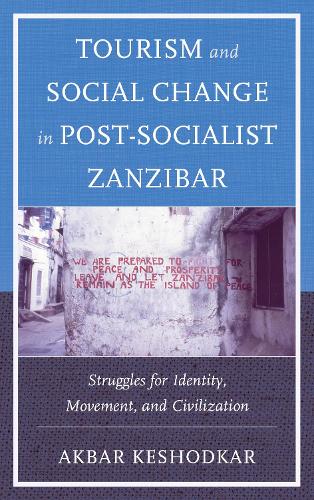
Tourism and Social Change in Post-Socialist Zanzibar: Struggles for Identity, Movement, and Civilization
(Paperback)
Publishing Details
Tourism and Social Change in Post-Socialist Zanzibar: Struggles for Identity, Movement, and Civilization
By (Author) Akbar Keshodkar
Bloomsbury Publishing PLC
Lexington Books
16th October 2015
United States
Classifications
Professional and Scholarly
Non Fiction
Social groups, communities and identities
Globalization
Anthropology
303.4096781
Physical Properties
Paperback
202
Width 149mm, Height 232mm, Spine 17mm
372g
Description
Notions of ustaarabu, a word expressing civilization, and questions of identities in Zanzibar have historically been shaped by the development of Islam and association with littoral societies around the Indian Ocean. The 1964 Revolution marked a break in that history and imposed new notions of African civilization and belonging in Zanzibar. The revolutionary state subsequently introduced tourism and the market economy to maintain its hegemony over Zanzibar. In light of these developments, and with locals facing growing socio-economic marginalization and political uncertainty, Tourism and Social Change in Post-Socialist Zanzibar: Struggles for Identity, Movement, and Civilization examines how Zanzibaris are struggling to move through the local landscape in the post-socialist era and articulate their ideas of belonging in Zanzibar. This book further investigates how movements of Zanzibaris within the emerging and contending social discourses are reconstituting meanings for conceptualizing ustaarabu to define their roots in Zanzibar.
Reviews
Keshodkar (Zayed Univ., Dubai) delivers a wonderful anthropological volume highlighting Zanzibaris' struggle for identity as the country embraces change in a postsocialist government and economy. Since the 1980s, Zanzibar has focused its economic development efforts on establishing tourism, which has resulted in unsustainable numbers of tourists and migrants flooding in from Tanzania, Kenya, and other mainland African countries. Through case study analyses and numerous narratives among stakeholders, Keshodkar points out that with a diverse population in Zanzibar, the local landscape has been modified and has impacted local constructions of belonging, whereby residents feel a sense of strangeness. Topics include movement, Islamic religion, politics, work and prosperity, consumption, mobility, gender, dress, family relations, and marriage. Needless to say, this text touches on many social aspects of community, and would be most appropriate for advanced undergraduate- and graduate-level collections focusing on the impacts of tourism, tourism planning, community tourism, and the anthropology of tourism. Readers will not be disappointed, especially as they read the eye-opening stories of struggle and courage among the Zanzibari people. Summing Up: Highly recommended. Upper-division undergraduates and above. * CHOICE *
Tourism and Social Change in Post-Socialist Zanzibar ...does an excellent job of documenting the ways in which Zanzibari women continue to navigate social spaces and redefine heshima up to the present day. . . . [It gives] a much more nuanced view of the possibilities women had in moving through Zanzibari society, and [it provides] much needed scholarly attention to the changing forms of womens respectability and empowerment throughout the last two centuries. * African Studies Review *
Author Bio
Akbar Keshodkar is assistant professor of anthropology at Moravian College, in Bethlehem, PA. His research interests include movement of identities in Muslim communities across the western Indian Ocean.
